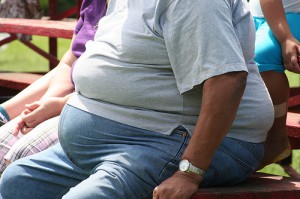 Much of this week’s headline news has focused on the increase in obesity in the UK with latest figures reporting around 25% of adults in the UK being diagnosed as clinically obese. Following the success of the London 2012 Olympics, the slogan ‘inspire a generation’ is hoped to help tackle the problem of obesity through encouraging increased participation in sport. This topic was discussed at the recent 8th National Orthopaedics and Sports Medicine Conference in London on the 18th-19th February. BMC Medicine joined approximately 80 delegates covering a large variety of disciplines including GPs, sports medicine physicians, orthopaedic surgeons, rheumatologists, and physiotherapists.
Much of this week’s headline news has focused on the increase in obesity in the UK with latest figures reporting around 25% of adults in the UK being diagnosed as clinically obese. Following the success of the London 2012 Olympics, the slogan ‘inspire a generation’ is hoped to help tackle the problem of obesity through encouraging increased participation in sport. This topic was discussed at the recent 8th National Orthopaedics and Sports Medicine Conference in London on the 18th-19th February. BMC Medicine joined approximately 80 delegates covering a large variety of disciplines including GPs, sports medicine physicians, orthopaedic surgeons, rheumatologists, and physiotherapists.

The conference began with speakers from the English Institute of Sport (EIS) who reflected on the legacy of the London 2012 Olympics, with a particular focus on the health benefits of encouraging children to engage in sport. Richard Weiler continued on this theme describing physical inactivity as a medical emergency and gave the shocking statistic that today’s ten year olds have a shorter life expectancy than their parents. This emphasises the need for increased interventions by both the medical community and the wider society to encourage children to get active.
Challe nges facing the EIS medical staff on the road to the Rio 2016 Olympics were also addressed. Rod Jaques discussed how identifying the Vitamin D3 status of elite athletes appears to be key in improving performance by reducing time out of training due to illness. A further promising area of research was discussed by Robert Erskine who gave an excellent presentation on genetics in sport. Our current understanding only scratches the surface, yet future research may hold exciting implications for both performance and injury factors in elite sport.
nges facing the EIS medical staff on the road to the Rio 2016 Olympics were also addressed. Rod Jaques discussed how identifying the Vitamin D3 status of elite athletes appears to be key in improving performance by reducing time out of training due to illness. A further promising area of research was discussed by Robert Erskine who gave an excellent presentation on genetics in sport. Our current understanding only scratches the surface, yet future research may hold exciting implications for both performance and injury factors in elite sport.
The use of platelet rich plasma (PRP) in the treatment of tendon injuries was discussed by Umile Giuseppe Longo where further research is required to uncover the true potential of PRP in the treatment of sporting injuries. An additional interesting area for future research is the use of bone morphogenic protein (BMP) which may be important in future treatment of stress fractures. Such advancements in orthopaedic and sports medicine research will benefit both elite athletes and the general population alike.
Further research in sports medicine can be freely accessed in our cross-journal article collection: Advances in Sports Nutrition, Exercise and Medicine. We are still accepting submissions on this topic, so if you would like your work to be considered, get in touch!
Comments